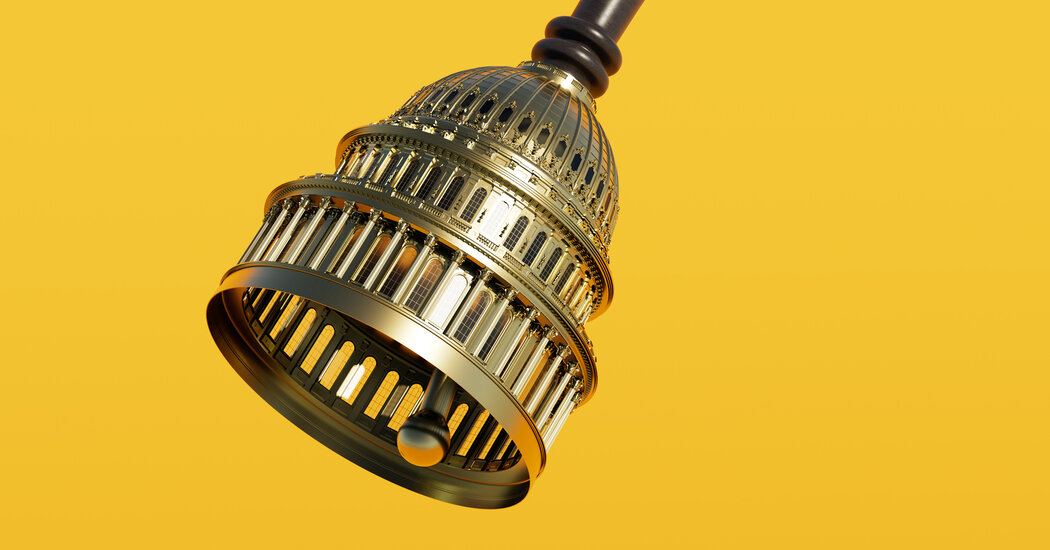The recent No Kings protests that drew millions of Americans into the streets are a mark of a renewed struggle against Donald Trump, whose aggressive demands for reshaping government and society have been extraordinary in his second term.
But not only resisting this president matters. Seizing the opportunity to reimagine the presidency, after Americans of all stripes built its authority over a century, is critical — which means a plan and promise to make Congress great again.
This will require not just movements but also politicians, including candidates for the highest office, who demand new forms of governance and the transfer of power back where it belongs.
Congress is the place to argue over and enact policies having to do with abundance and redistribution, climate sanity and infrastructure progress, while the president and the courts ought to be the servants of the laws Congress makes. That is true when it comes to grand strategies of war and peace, as well as what objectives and plans our administrators should elaborate and executives enforce.
The excesses of Mr. Trump’s second term force his opponents to adopt an experimental attitude toward government design that reinvents rather than restores our institutions. It is a reminder of the progressive movement, which in the late 19th and early 20th centuries featured a similar attitude about Americans’ relationship to the federal government. But the efforts by Mr. Trump also require reckoning with the mistakes of the progressive era and its aftermath.
For the first half of American history, the presidency was modest, and the Constitution didn’t clearly suggest that it should be any other way. The mission of the executive was to “faithfully execute the laws” — meaning the laws Congress passed — as well as to fight the wars that the legislature declared.
Our modern presidency goes back not to the founding, but to the progressive movement. A reformer like Woodrow Wilson, when he wrote his book “Congressional Government” in 1885, insisted that a new era of American life made new demands on the central institution, the legislature. In a new phase of capitalism and civilization, Congress needed innovations to ensure that it would supervise a new kind of administrative state to work out the details.
The progressives struggled to make the Constitution’s rules more democratic, in a spate of formal amendments. Over the years, Congress created a slew of new agencies like the Federal Reserve (started in 1913), the Federal Trade Commission (1914) and the National Labor Relations Board (1935).
Such experiments were sheltered from presidential power by prohibiting easy removal of their members — a power the conservative majority on the current Supreme Court appears ready to hand over to Mr. Trump. But they also represented a choice, in a world with new technologies and industries, to let experts rule.
Wilson soon came to sing a different tune about whether to improve the legislature. By 1900, he had confessed that his earlier ideas about congressional supremacy were “hopelessly out of date.” Congress wasn’t likely to do the work progress required, only to bog it down and retard it.
A more effective and resourceful presidency would do the trick, he wrote in 1908, allowing a leader with “the personality and the initiative to enforce his views both upon the people and upon Congress.” As president, Wilson became that man. He was representative of a breed of progressives who adopted the fateful shortcut of empowering the presidency for their own purposes, which continued with Franklin Roosevelt through the New Deal.
Conservatives gave up much of their resistance to a powerful president during the Cold War, especially after Ronald Reagan was elected. But Democrats and Republicans alike acceded to and pushed for these changes — often out of good intentions, which predictably paved the road to our current hell. Power grabs made it more natural to think of the executive as on its own in matters of war and peace, and of the administrative state not as helping Congress with its work, but doing the president’s sole bidding.
Conservatives developed a “unitary executive theory” that cast almost our entire network of government institutions as no more than emanations of the president’s goals and will. But Democrats, who developed their own theories of executive initiative, have rarely been above seeing presidential authority as useful when they exercised it over our bureaucrats.
In between Mr. Trump’s two terms, Joe Biden — once a master of the Senate — showed some memory of what it means to change the country through legislation. But he equally opted for executive orders (such as immigration policies or student loan forgiveness) that abstained from seeking congressional support for the sake of a quick fix.
A movement to reinvent government can start by insisting that politicians embrace the responsibilities they currently spurn in Congress, while committing to downsizing the presidency through legislative action.
Since the smoke at Pearl Harbor cleared, Congress has largely abstained from its constitutionally mandated leadership in war making — aside from a partial reset after Richard Nixon’s high jinks. There were brief debates in 2020 about the militarism of the presidency in recent decades, but even easy choices failed — like repealing long-ago passed blank checks that every executive since has cited for war. Old loopholes have to be closed — and old permission slips the president has given himself in the meantime challenged.
One element of this program is an improved War Powers Resolution to constrain the executive’s discretion to order the armed forces into harm’s way. And Congress must take seriously its obligation to repeal or replace laws like the Alien Enemies and Insurrection Acts, which have always been ripe for abuse.
Congress must also reclaim its authority to build an administrative state that is a reflection of its policy goals, rather than an instrument for each president claiming a mandate. Equally essential is a suite of clearer laws insisting that the executive branch spend Congress’s outlays, while constraining the president’s ability to fire personnel and restructure government.
A century ago, progressives banded together with platforms for core state and federal constitutional and legislative reform. This work is harder now, with executives unlikely, once they hold power, to willingly give up the office’s accreted powers. But there is no alternative to building an accountable government.
The Supreme Court — which has contributed to empowering the president and hobbling Congress — might resist. But confrontation with the court has happened before in our history, most recently in the New Deal, to make reforms stick.
The extremity of Mr. Trump’s second term provides both the best opportunity in decades for such a reset and the most urgent possible reason for it.
Samuel Moyn, a professor of law and history at Yale, is the author of “Liberalism Against Itself: Cold War Intellectuals and the Making of Our Times.”
The Times is committed to publishing a diversity of letters to the editor. We’d like to hear what you think about this or any of our articles. Here are some tips. And here’s our email: [email protected].
Follow the New York Times Opinion section on Facebook, Instagram, TikTok, Bluesky, WhatsApp and Threads.
The post Resistance to Trump Isn’t Enough appeared first on New York Times.




